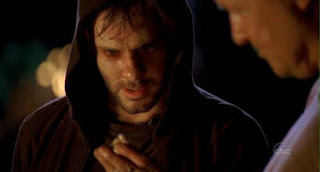I find it funny that the very first thing that the Lost crew does is release an episode about the nature of knowledge. Given how many people were all about trying to dissect the show and figure it out I find it ironic that the first thing the show does is go out of its way to discuss the basic ideas of information. You've got Kate, for whom information is a threat to truth, Sawyer, who refuses to act on information and condemns a man to death, and Jack tries to let information go and focus on the task at hand. If there is any episode that states the inadequacy of approaching this show as merely as a puzzle to be solved it's this one.
So, the sum up is that the air marshal is dying, and Jack accidentally finds out that Kate is a murderer. The episode dips a bit into Kate's backstory, showing her rather dodgy history with the truth. We also dip a bit into Michael's issues with Locke. And see Sawyer fail to be a decent person for not the last time.
 |
| AN ACTUAL SCENE WHERE TOO MUCH INFO IS A BAD THING. HOW MUCH MORE OBVIOUS CAN WE GET? |
The truth around Kate is complicated, and is therefore hard to communicate adequately. She had killed the man who had abused her multiple ways, after finding out that he's actually her father. That's... complicated. That's not a simple thing to explain to anyone. So why would Kate even attempt to do so, to anyone? I think Kate is totally justified in not sharing the truth with anyone, ever. It's really not a grey thing, at least to me.
So yeah, I'm gonna die on that hill.
Come at me, folks.
Moving onto someone else, Sawyer doesn't care about anyone else's truth. Like, at all. I'd forgotten just how insufferable Sawyer was at the beginning. There's a lot of really grinding stereotypical remarks going on, which just grind all the harder when you take characters like Sayid and call them "Al-Jazeera". Sawyer's mind is perpetually made up and that just makes him grate and grate and grate... right up until the end, when Sawyer decides enough's enough and he's going to act on his stupid ideas. It doesn't go well, what a surprise! He talks Kate into giving him the gun the others had entrusted her with. And condemns the marshal to a horrifying desk, because Sawyer is a jackass. This won't be the last time Sawyer condemns people to horrible fates because he thinks he knows best. And it's all out, right here, in the third episode of the show.
Jack wants to focus on the matter at hand, and tries to only use the information he thinks is relevant to that situation, despite everyone else wanting him to jump to conclusions about Kate and the marshal. I really Jack's ending statement: everyone should get the chance to start all over. Given what we'll find out about Jack we know he's saying that about himself is a lot more than he would say that about anyone. Jack has always wanted to be the hero. He's always wanted to be the hero. Now that he's got that chance Jack tries to live up to what he always wanted to be. And he impresses that upon Kate at the end.
But it's Locke who has the best idea: realizing that the truth can only take you so far, given how fragile everyone can be. Seeing how Michael and Walt can barely carry on a conversation, Locke ignores Michael's hatred to help the father out. I really like how Locke just sits through most of the episode, crafting that whistle, focusing on the one thing he knows he can do right.
And, once everyone starts doing that, for however short a time they can manage, you get this incredible ending.
I leave you with that ending, because there's something special about it. This remains one of my favorite episodes.


